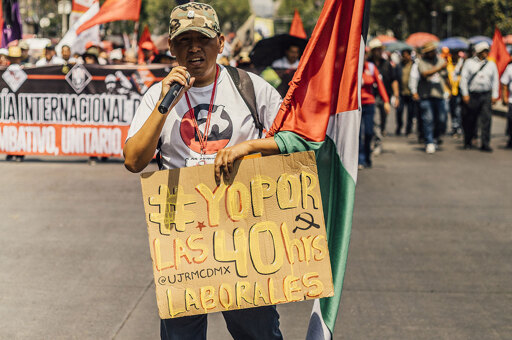This article by Sandra Rojas originally appeared in the November 19, 2025 edition of La Cadera de Eva, a Mexican digital journalism portal with a gender focus, which endeavours to create a feminist space where journalism can be practiced with a critical and intersectional perspective. We thank La Cadera de Eva for permission to translate and publish this article, and encourage you to visit their site.
The National Front for the 40-Hour Workweek celebrates its second anniversary this November 23rd with a nationwide mobilization. Its message is clear: the reduction of the workweek must be implemented now and not delayed until 2030, a proposal they claim makes no sense in the country with the longest working hours among the Organization for Economic Cooperation and Development (OECD).
In an interview for La Cadera de Eva, Adriana Zentella, a member of the national coordination of the Front, stressed the importance of keeping the debate alive on the need to modify the working day in Mexico.
Below are the key points of the fight for a reduction in working hours.
What does the National Front for 40 Hours demand?

The demand to reduce working hours is deeply linked to the income crisis and job insecurity experienced by the working population in Mexico.
According to the National Survey of Occupation and Employment (ENOE), 32.9 million people earn poverty wages, insufficient to purchase two basic food baskets per month. This represents 67% of those who are employed, a higher proportion than that recorded before the pandemic.
Economic inequality is also reflected in the fact that, while companies’ Gross Operating Margin increased by 18.4% since 2014, the average real income of the population fell by 0.6%. During that same period, the cost of the basic food basket doubled.
Other indicators from the Decent Work Observatory show the depth of precariousness:
60% of young people work without a permanent contract.41% do not have benefits.35.1 million people lack social security.
What does the law say today about working hours?
The 40-hour workweek has not yet been approved and is not currently in effect under the Federal Labor Law (LFT); it remains a proposed constitutional and legal reform. Currently, Article 123 of the Constitution and the LFT establish a maximum workweek of 48 hours divided into eight hours per day for six working days, with at least one mandatory day of rest.
However, in practice, workers often exceed even that limit. In this article, Sierra Wells, a data analyst at Data Cívica, explained that one in four people works more than 56 hours a week without facing penalties.
In response to this situation, the Front has called for a national mobilization on November 23rd in all states of the country. In Mexico City, the march will depart from the Zócalo and proceed to the Senate.
The central message they seek to send to legislators and the working population is forceful: the implementation of the 40-hour workweek must be immediate and “without gradualism”.

Why should working hours be reduced without a gradual approach?
Although the Presidency and the Ministry of Labour announced that the initiative will be presented this November, the Front opposes a timetable that delays implementation until 2030.
Zentella explains that Mexico is “far behind” in terms of working hours. The country has maintained the 48-hour workweek limit —inherited from the Mexican Revolution—for over a century. “How is it possible that in more than 100 years the number of hours we dedicate to work hasn’t changed?” the Front asks.
OECD data shows that Mexico is the country where people work the longest hours, averaging 48 hours per week. However, this does not translate into greater productivity: according to Eurostat and the OECD, countries with shorter workweeks—such as Germany and Denmark—are more productive per hour worked.
According to Zentella , working such long hours only creates more tired, worn-out, and alienated people. Therefore, the official proposal for a gradual implementation until 2030 “makes no sense.”
It is worth remembering that on October 14, President Claudia Sheinbaum announced that the official proposal will be gradual and will seek consensus with employers and unions.
Zentella acknowledges that the struggle has faced resistance and episodes of violence, mainly from business sectors, corporate unions, and the government itself.
He points out that the most dangerous thing has been “putting their bodies on the streets,” where they have faced harassment and being surrounded by riot police.
On social media they have also been the target of smear campaigns : “They always invent stories that the right wing, MC or the PRIAN pay us… that’s why we have been emphatic that we are a non-partisan front ,” says Adriana Zentella.
The Front insists that its slogan is for the working class and that it does not respond to partisan interests.

Tijuana mobilization, August, 2025 Photo: YoPorLas40Horas Twitter
The fight for the 40-hour workweek and care work
The reduction of working hours directly impacts women, who historically face the double or triple burden: paid employment, unpaid care work, and domestic work.
Zentella, who points out that many members of the Front are feminists, emphasizes the importance of making unpaid work visible. In Mexico, this work falls primarily on women.

According to the 2022 National Survey for the Care System (ENASIC), 75.1% of those who perform care work are women. This equates to approximately 23.8 million women who carry out these tasks in their homes.
In addition, in Mexico , only 46% of women participate in the paid economy , compared to 77% of men, according to the Mexican Institute for Competitiveness (IMCO).
The main reason? Care work.
Currently, 14.6 million women cannot go out to work because they perform unpaid care work , according to the Decent Work Observatory (OTD).
The Front has positioned this issue in forums and events, and has two commissions dedicated to it: the Women’s Commission and the Vulnerable Populations Commission.
Among their proposals are the extension of maternity leave and the strengthening of paternity leave to promote male co-responsibility in caregiving .
What would change if we had more free time?
Speaking about the positive impact of a reduced workday, Adriana Zentella mentioned that if we had more time that wasn’t just for work, we could have a society with ” workers who are more rested, happier, and more focused on what they like to do.”
Reducing working hours would allow for more time for culture, leisure, sports, study, and even health care, such as medical checkups or exercise. Zentella concluded that life isn’t just about work, because “work is a support for life, but it’s not everything.” The most important thing is that people can invest that extra time with “family, friends, and loved ones.”

Sandra Rojas studied Communication and Journalism at UNAM, has worked at Milenio and is now part of the team at La Cadera de Eva*, where she writes about what hurts and moves her: violence, resistance, and the dignity of women.*
Donald Trump & the Coup Plotters Who Betray Mexico
November 21, 2025November 21, 2025
Our government must be vigilant in punishing those who commit the crime of treason, since opposition figures in Mexico periodically express their hope that Trump will take action against the government, without ruling out armed intervention.
El Poder del Consumidor Demands Suspension of Coca Cola Christmas Caravans
November 21, 2025November 21, 2025
Coco Cola propaganda parades are held in different cities across Mexico, representing one of the most persuasive advertising strategies aimed at children by appropriating powerful symbols and cultural values that they associate with a product that has a serious impact on the population’s health.
 Analysis | Interviews | Labor
Analysis | Interviews | Labor
“Life isn’t just about work”: Why the 40-Hour Week Can’t Wait
November 21, 2025
Mexico’s National Front for the 40-hour Workweek marks its second anniversary with nationwide mobilizations demanding an immediate reduction in working hours, in a country that works the most in the OECD.
The post “Life isn’t just about work”: Why the 40-Hour Week Can’t Wait appeared first on Mexico Solidarity Media.
From Mexico Solidarity Media via this RSS feed




